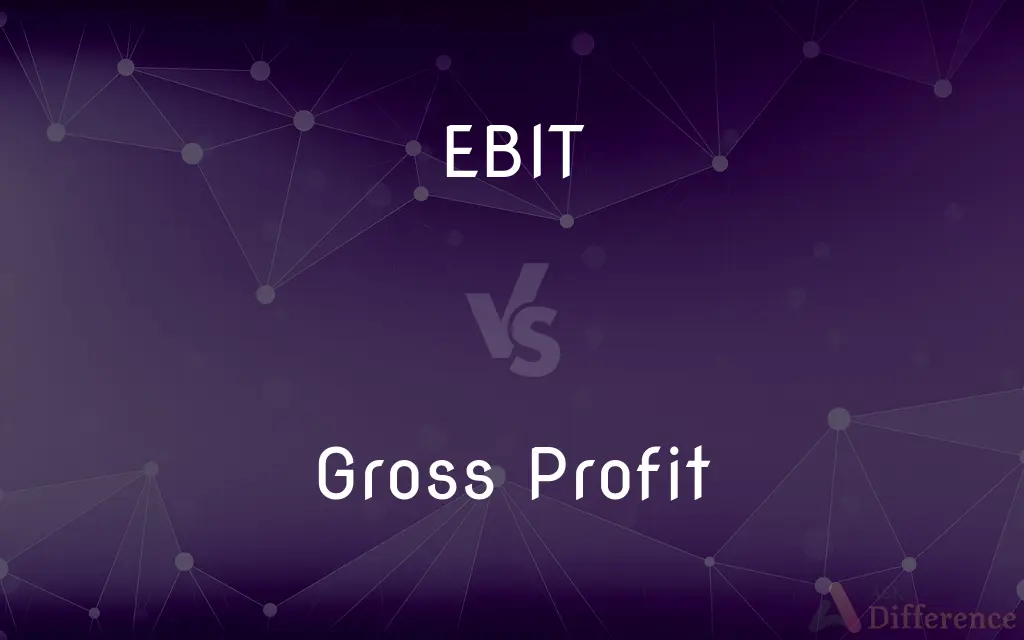EBIT vs. Gross Profit — What's the Difference?
By Fiza Rafique & Maham Liaqat — Published on March 23, 2024
EBIT represents a company's profitability excluding interest and tax expenses, focusing on operational efficiency. Gross profit, on the other hand, is the initial profit figure calculated by subtracting the cost of goods sold (COGS) from revenue.

Difference Between EBIT and Gross Profit
Table of Contents
ADVERTISEMENT
Key Differences
EBIT is a key financial metric that provides insight into a company's operational performance by excluding non-operational expenses like interest and taxes. This measure allows investors and analysts to understand how effectively a company generates profit from its core operations before the impact of financial structure and tax obligations.
Gross profit, however, is calculated earlier in the income statement and serves as a fundamental indicator of a company's manufacturing or trading efficiency, essentially reflecting the margin made from buying or producing and selling goods before administrative, sales, and other expenses are considered.
The calculation of EBIT involves subtracting operating expenses, such as salaries, rent, and utilities, from gross profit. This process further filters the company's earnings to focus on operational profitability, excluding the cost of goods sold and operational expenses from total revenue. Gross profit calculation is simpler, directly indicating the profit margin on products or services sold, which is crucial for pricing strategies and cost control measures.
EBIT provides a broader view of a company's financial health by incorporating all operational expenses, making it a useful metric for comparing companies across different industries or tax environments. Gross profit is more narrowly focused, offering insight into the production or purchase efficiency of the company's core business activities, but it does not account for the impact of operational scale, administrative efficiency, or financial leverage.
Both EBIT and gross profit are critical for financial analysis and decision-making. EBIT is particularly relevant for assessing operational performance and making cross-sectoral comparisons, while gross profit is essential for understanding the profitability of a company's products or services and for internal cost management. In investment analysis, both figures are used to gauge a company's financial health, operational efficiency, and potential for future growth.
ADVERTISEMENT
EBIT offers insight into the company's overall operational efficiency, while gross profit focuses specifically on the cost-effectiveness of the core business operations. The distinction between these two metrics highlights different aspects of a company's financial performance, with EBIT reflecting broader operational achievements and gross profit focusing on the profitability of selling goods and services.
Comparison Chart
Definition
Profitability excluding interest and taxes.
Revenue minus cost of goods sold.
Focus
Operational efficiency and overall profitability.
Efficiency of core business activities.
Excludes
Interest and taxes.
Operating expenses, interest, and taxes.
Indicates
Overall operational performance.
Profit margin on products or services.
Useful For
Comparing companies across industries; assessing operational performance.
Pricing strategies; cost management within core operations.
Compare with Definitions
EBIT
It includes all operational expenses.
EBIT considers costs like salaries and rent, showing true operational performance.
Gross Profit
Focuses on core business activities.
Gross profit reflects the financial health of the company's primary operations.
EBIT
Indicates operational profitability.
A rising EBIT suggests the company is becoming more efficient in its operations.
Gross Profit
Gross profit is sales revenue minus the cost of goods sold.
The company's gross profit margin declined due to higher production costs.
EBIT
Useful for cross-industry comparisons.
EBIT allows investors to compare companies regardless of their tax or financing structures.
Gross Profit
Crucial for pricing and cost strategies.
Gross profit analysis helps in setting competitive prices while maintaining margins.
EBIT
Excludes financial and tax effects.
By excluding interest and taxes, EBIT presents a clear picture of operational success.
Gross Profit
First profitability indicator on the income statement.
Gross profit is the initial measure of profitability, showing the margin on sales.
EBIT
EBIT reflects a company's profit from operations before interest and taxes.
The company's EBIT increased, indicating improved operational efficiency.
Gross Profit
It measures efficiency in production or trading.
An increasing gross profit indicates improved cost control in manufacturing.
EBIT
An entangled bit (in a quantum computer)
Common Curiosities
What is EBIT?
EBIT is a financial metric indicating a company's operational profitability before the impact of interest and taxes.
What does gross profit reveal?
Gross profit reveals the efficiency and profitability of a company's core business activities, specifically the margin between sales revenue and the cost of goods sold.
What happens if gross profit is low?
A low gross profit suggests that a company is not efficiently managing its production or purchasing costs, which could lead to financial difficulties.
Is EBIT or gross profit more important for investors?
Both EBIT and gross profit are important for investors; EBIT for understanding operational efficiency and gross profit for assessing product or service profitability.
Why is EBIT important?
EBIT is important for assessing a company's operational performance independently of its financing structure and tax environment.
How do companies improve their EBIT?
Companies can improve their EBIT by increasing revenue, reducing operating expenses, or both, to enhance operational efficiency.
How does gross profit affect a company's financial health?
Gross profit affects a company's financial health by indicating how effectively it can cover operating expenses, interest, and taxes while generating profit.
Can EBIT be negative?
Yes, EBIT can be negative if a company's operating expenses exceed its gross profit, indicating operational losses.
What strategies can increase gross profit?
Increasing prices, reducing the cost of goods sold, or improving operational efficiency can increase gross profit.
How do interest and taxes impact EBIT and gross profit?
Interest and taxes do not impact EBIT and gross profit calculations directly; EBIT excludes these expenses to assess operational performance, while gross profit focuses on the cost and revenue relationship before operational expenses.
Share Your Discovery

Previous Comparison
Bi-Weekly vs. Accelerated Bi-Weekly
Next Comparison
Political Leadership vs. Military LeadershipAuthor Spotlight
Written by
Fiza RafiqueFiza Rafique is a skilled content writer at AskDifference.com, where she meticulously refines and enhances written pieces. Drawing from her vast editorial expertise, Fiza ensures clarity, accuracy, and precision in every article. Passionate about language, she continually seeks to elevate the quality of content for readers worldwide.
Co-written by
Maham Liaqat










































